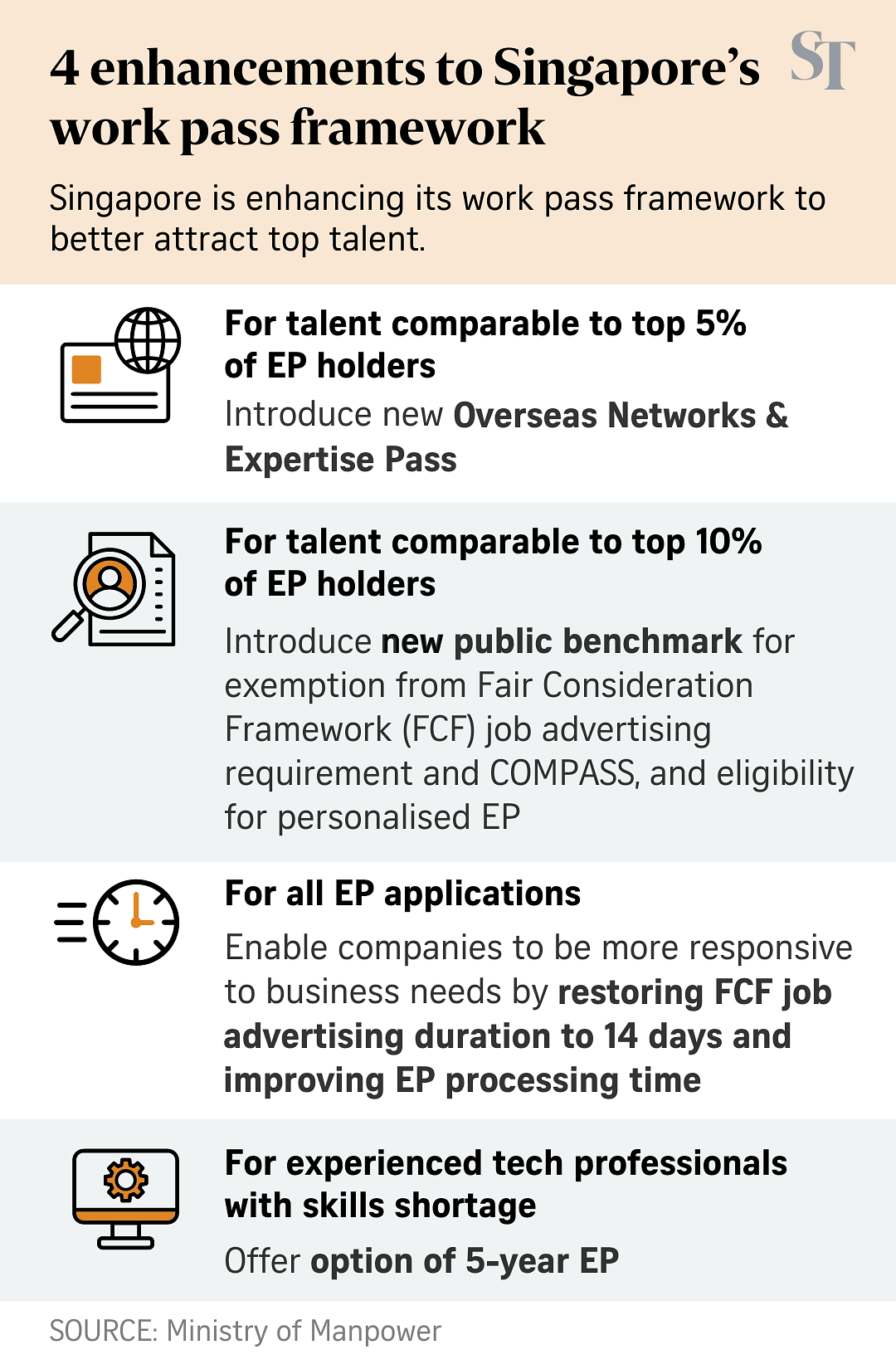Singapore's new work pass likely to attract top talent with niche tech skills
Sign up now: Get ST's newsletters delivered to your inbox

The pass could entice more global firms to situate their headquarters in Singapore, said EuroCham president Federico Donate.
PHOTO: ST FILE
SINGAPORE - Top performers who are sought after for their niche technical skills working on multiple projects for different firms - this is the kind of foreign talent that a new work pass, the Overseas Networks and Expertise Pass, could appeal to.
These fields include data science and vaccine development, as well as entrepreneurs setting up firms that blend traditional industry and tech, such as agri-tech, said Dr Lei Hsien-Hsien, chief executive of the American Chamber of Commerce in Singapore.
The new pass, applications for which will open on Jan 1 next year, is among a slew of changes to the work pass framework for foreign professionals announced by Minister of Manpower Tan See Leng on Monday (Aug 29).
Other changes include updated job advertising requirements under the Fair Consideration Framework and adjustments to the existing Employment Pass (EP) scheme.
Under the new pass, individuals who earn a fixed monthly salary of $30,000 and above, which is comparable to the top 5 per cent of EP holders, have added flexibility to take on multiple jobs or set up a business.
Individuals with outstanding achievements across arts and culture, sports, science and technology, and research and academia can also qualify for the pass even if they may not meet the salary criterion.
"Now these individuals can be top consultants, filling the needs of multiple companies that need this expertise," said Dr Lei, noting that this would help companies manage their budgets as they need pay for talent only for the duration of the project.
Mr Kurt Wee, president of the Association of Small and Medium Enterprises, said that even if the pay cheque of such talent is split across multiple firms, the high salary requirement remains out of reach of most SMEs, except for those that require highly demanding specialised roles such as artificial intelligence.
However, he applauded the move to reduce the Fair Consideration Framework job advertising requirement to 14 days amid a broad labour crunch, from 28 days at the peak of the Covid-19 pandemic.
"It makes sense, because if you can't get anyone within the first 14 days (in a tight labour market), 28 days doesn't make a difference, so the recruitment process is a bit more efficient," he said.
Mr Wee added that he hopes a higher S Pass quota for SMEs in the services sector will also be introduced.
Mr Wee added that he hopes a higher S Pass quota for SMEs in the services sector will also be introduced.
Mr Lam Yi Young, chief executive of the Singapore Business Federation, said: “The enhancements will help businesses here to grow and be more globally competitive.
“Over time, the enhancements will also help raise the capabilities and skill levels of Singaporeans, and support Singapore’s economic growth.”
“Over time, the enhancements will also help raise the capabilities and skill levels of Singaporeans, and support Singapore’s economic growth.”
Mr Federico Donato, president of the European Chamber of Commerce (Singapore), said the new pass could help attract talent in fields such as digital technology and sustainability.
The pass could also entice more global firms to situate their headquarters – which would need to be mostly staffed by Singaporeans – in Singapore, as their top management could qualify for the new pass, he noted.
However, he hopes more will be done to relieve shortages in lower-wage roles such as nursing as well.

The Singapore National Employers Federation (SNEF) said in a statement that the ability of those holding the new pass to bring their spouses and dependants, who may have to give up their careers at home, to Singapore is an important consideration for relocation.
"Hence, by allowing spouses to work through a Letter of Consent, this will likely make top talent consider Singapore more favourably.
"At the same time, SNEF strongly encourages Singaporeans to seize overseas posting opportunities and venture out so that they can be developed to take on regional and global roles," added the federation, citing government programmes such as the Global Ready Talent Programme that aims to groom Singaporeans into global talents.
"At the same time, SNEF strongly encourages Singaporeans to seize overseas posting opportunities and venture out so that they can be developed to take on regional and global roles," added the federation, citing government programmes such as the Global Ready Talent Programme that aims to groom Singaporeans into global talents.
Mr Patrick Tay, assistant secretary-general at the National Trades Union Congress (NTUC), said: "By welcoming top talents whose expertise lies in sectors such as deep tech and specialised science or research roles, we can leverage their learning and knowledge sharing to groom and nurture local talents in these fields."
Mr Tay, who is also MP for Pioneer, suggested that the Government consider disclosing a list of reputable companies that employ top talents and roles to be shared externally for added accountability.
He also said NTUC preferred a longer job advertising period to give good local candidates a better chance to respond and allow companies to consider a wider range of candidates.
But NTUC also understands that the decision was made partly in response to the tight labour market and that it was not an easy one for the Government, he added.
"We do hear of concerns from our professionals, managers and executives (PMEs) on the ground, so NTUC will continue to monitor this situation very carefully to ensure there are adequate safeguards and that abuses, if any, are eradicated," said Mr Tay.
"At the end of the day, we want to ensure that companies exhaust all avenues on employing local PMEs before considering an EP holder."


